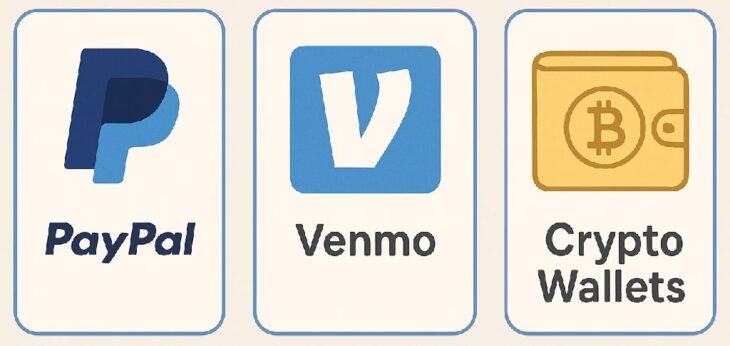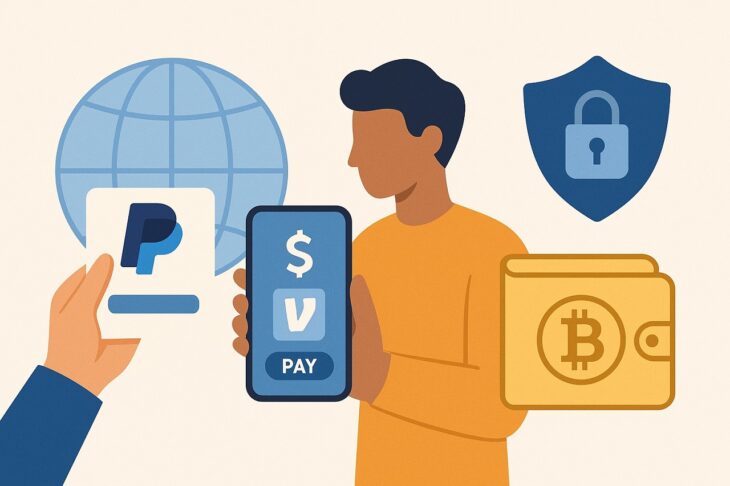Whether you’re running a business, splitting bills with friends, or buying online, knowing which digital payment platform to choose can directly impact cost, speed, and security. The three most prominent options—PayPal, Venmo, and crypto wallets—serve overlapping but distinct needs.
So what’s the best option?
- PayPal is the most versatile and globally accepted platform, suitable for business, e-commerce, and international payments.
- Venmo is ideal for fast, casual, domestic money transfers within the United States.
- Crypto wallets are powerful for decentralized finance (DeFi), borderless transactions, and digital asset storage, but they come with higher technical barriers and risk.
Table of Contents
Toggle1. Overview of Each Platform

| Platform | Type | Key Use Case | User Base (2024) | Owner / Creator |
| PayPal | Centralized digital wallet | Online payments, business transactions | 426+ million active users | PayPal Holdings, Inc. |
| Venmo | Peer-to-peer mobile payment app | Fast, social transfers | ~90 million users | Owned by PayPal |
| Crypto Wallets | Decentralized wallet (custodial/non-custodial) | Asset control, DeFi, international transfers | Fragmented (100M+ globally) | Open-source or platform-based |
Venmo, owned by PayPal, is a U.S.-only peer-to-peer app with around 90 million users. It’s designed for quick, casual payments between friends and includes a social feed for sharing transaction notes.
Crypto wallets are decentralized tools used for managing digital assets. With over 100 million users globally, they support cryptocurrency transfers, DeFi platforms, and NFT trading. Their features vary widely based on whether they are custodial or non-custodial.
2. Account Setup and Accessibility
| Feature | PayPal | Venmo | Crypto Wallets |
| Account Setup | Email + bank/card | U.S. phone + bank | Wallet creation or app install |
| ID Verification Required | Yes | Yes | Sometimes (varies by type) |
| Available Globally | Yes (200+ countries) | No (U.S. only) | Yes (but exchange access varies) |
| Platform Dependency | Centralized | Centralized | Non-custodial = independent |
Venmo setup needs a U.S. phone number and a U.S. bank account. It’s mobile-only and not available internationally.
Crypto wallets are created through an app or browser extension. Non-custodial wallets do not require ID but require saving a recovery phrase.
Custodial wallets like Coinbase may require full ID verification.
3. Payment Use Cases and Functionalities
| Use Case | PayPal | Venmo | Crypto Wallets |
| Peer-to-peer transfers | |||
| Online purchases | (limited) | (select merchants) | |
| Subscription payments | ✘ | ✘ | |
| Freelancer/business payments | (casual) | (depends on platform) | |
| Retail POS integration | (Zettle) | Limited | Rare |
| Crypto transfers | ✘ | ✘ | |
| Bill-splitting features | ✘ | ✘ |
According to Webopedia, the number of active crypto casinos surged in 2024 and continues to grow in 2025, with platforms like Stake, Bitcasino.io, and BC.
To keep track of winnings and losses effectively, many players rely on a btc calculator to convert their crypto amounts into fiat currency, making it easier to manage budgets and understand the real value of their bets.
The game offers support for dozens of cryptocurrencies such as Bitcoin, Ethereum, and Tether.
4. Transaction Speed

| Transaction Type | PayPal | Venmo | Crypto Wallets |
| P2P transfer | Instant (internal) | Instant (internal) | Minutes (depends on blockchain) |
| Bank transfer (standard) | 1–3 business days | 1–3 business days | Not applicable |
| Instant withdrawal | Yes (1.75% fee, up to $25) | Yes (same fee model) | ✘ (not relevant to traditional banks) |
| Network congestion risk | Low | Low | High (ETH gas fees, for example) |
Both platforms offer instant withdrawal options to debit cards, but they charge up to 1.75% in fees.
Crypto wallets rely on blockchain confirmation times, which can range from a few seconds (like Solana) to over 15 minutes (like Ethereum under heavy load). Network congestion can significantly delay crypto transactions and raise fees.
The decentralized nature of blockchain adds flexibility but also introduces unpredictability.
5. Fees and Costs Breakdown

| Transaction Scenario | PayPal | Venmo | Crypto Wallets |
| Sending from the balance/bank | Free | Free | Gas fees (network-dependent) |
| Sending from a credit card | 2.9% + fixed fee | 3% | N/A |
| Instant withdrawal to the bank | 1.75% (max $25) | 1.75% (max $25) | Not available |
| Currency conversion | 3–4% above mid-market rate | Not supported | Varies by exchange (0.25–2%) |
| Merchant processing fee | 2.9% + $0.30 per transaction | N/A | N/A (unless using a crypto processor) |
Crypto wallets use a different model entirely, depending on gas fees, which can be very low (fractions of a cent on Solana) or very high (over $10 on Ethereum).
Crypto avoids merchant fees unless you’re integrating with a processor like BitPay or Coinbase Commerce. Currency conversion fees on PayPal are significantly higher than most crypto exchanges.
Venmo does not support foreign currency conversions at all, making it unsuitable for international transactions.
6. Security & Privacy
| Feature | PayPal | Venmo | Crypto Wallets |
| Encryption | Yes | Yes | Yes |
| 2FA | Optional | Optional | Strongly recommended |
| Buyer Protection | Yes (for goods/services) | No | No |
| Control over private keys | No | No | Yes (non-custodial only) |
| Exposure to chargebacks | Yes | Yes | No |
| Privacy level | Moderate | Low (social feed visible) | High (if using self-custody) |
PayPal and Venmo offer strong encryption and some fraud protection, but they are centralized, meaning your funds can be frozen under certain conditions. Buyer protection makes PayPal attractive for transactions involving goods and services, unlike Venmo or crypto wallets.
Venmo’s social feed reduces user privacy, as others can see transaction notes unless manually restricted.
Crypto wallets, especially non-custodial ones, offer the highest privacy and direct control, but they require users to secure their keys. If you lose a private key or recovery phrase, your funds are lost permanently.
On the upside, crypto transactions are irreversible, protecting merchants from chargeback fraud.
7. International Use and Accessibility

| Platform | Global Transfers | FX Fees | Regional Limitations |
| PayPal | Yes | ~4% | None in supported countries |
| Venmo | No | N/A | U.S.-only |
| Crypto Wallets | Yes | Low | Exchange access may vary |
Crypto wallets are globally accessible, but converting crypto into local fiat currencies often requires using exchanges, which may be restricted by local law.
Despite this, crypto enables borderless value transfer without reliance on traditional banks. Its international utility is especially attractive for freelancers, expatriates, or people in countries with limited financial infrastructure.
Users must still be aware of regulations that affect access to exchanges or token usage in certain regions.
8. Business Features and Merchant Support
| Feature | PayPal | Venmo | Crypto Wallets |
| Business accounts | Yes | No | Limited |
| Payment gateway integration | Yes (PayPal, Braintree) | No | Yes (e.g., Coinbase Commerce, BitPay) |
| Invoice support | Yes | No | No native invoicing |
| Integration with e-commerce | Shopify, eBay, WooCommerce | No | Limited (mostly Web3 stores) |
| Subscription billing | Yes | No | No native support |
PayPal is the most mature solution for businesses, with full support for invoicing, subscriptions, and payment gateway integration. Venmo is designed for casual P2P use and doesn’t offer dedicated business services.
Crypto wallets are gaining traction in niche e-commerce and Web3 spaces, but lack traditional invoicing and billing tools.
Some crypto gateways bridge the gap by offering plugins for WooCommerce or Shopify. However, the lack of universal standards and regulatory uncertainty still pose adoption challenges.
For traditional online retail, PayPal remains the most reliable option today.
9. Long-Term Viability and Ecosystem
| Metric | PayPal | Venmo | Crypto Wallets |
| Platform maturity | 25+ years | 15 years | 10–14 years (varies) |
| Regulatory compliance | High | High | Mixed (depends on region) |
| Ecosystem integration | Strong | Moderate | Expanding in DeFi/Web3 |
| Dependence on the company | High | High | Low (non-custodial wallets) |
| Risk of obsolescence | Low | Moderate | Depends on crypto adoption |
Crypto wallets are the most innovative but face hurdles in mass adoption due to regulatory concerns and user complexity. Their decentralized nature means users are not locked into one company, giving more flexibility but also requiring more technical knowledge.
As Web3 evolves, crypto wallets may become more mainstream, especially in areas like NFTs, DeFi, and borderless commerce. Long-term success will hinge on regulation, usability, and public trust.
Bottom Line
Each platform excels in specific situations, and the right choice depends on your goals.
Use PayPal if you need a globally trusted payment solution with strong buyer protection, business tools, and integration with platforms like Shopify or eBay. It works in over 200 countries, supports 25+ currencies, and is ideal for freelancers, online merchants, and international transactions, despite its 4% FX fees and credit card surcharges.
Choose Venmo if you live in the U.S. and want a fast, easy, and free way to split costs with friends. With 90 million users, it’s great for casual, domestic payments and offers instant transfers, but has no international support, limited business use, and minimal privacy protections.
Go with a crypto wallet if you’re comfortable with digital assets and want full control over your funds. Crypto wallets are essential for DeFi, NFTs, and borderless finance, offering low transaction fees and no middlemen.
But they also come with higher risk, require more technical knowledge, and lack built-in buyer protections.



